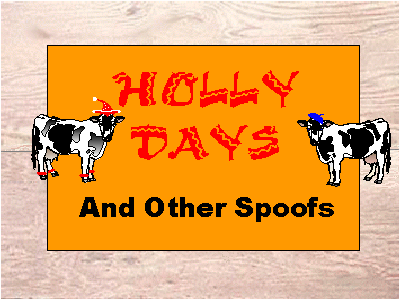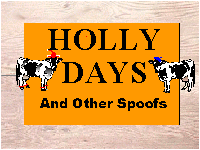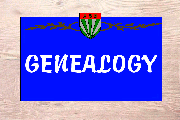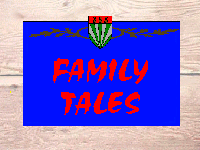Welcome to Scott's

|
~ A DAY OF FOOLS ~ |
|
There are many theories as to the origin of "April Fool's Day,"
or "All Fool's Day" as it is also known (by its closest friends).
As Mark Twain so eloquently noted: "The first of April is the day we remember what we are the other 364 days of the year." Although Fool's Day type activities have been observed for centuries in various fraternities and countries around the world, the actual origin of the custom is unknown. It resembles other festivals, such as the Hilaria of ancient Rome (March 25) and the Holi festival of India (ending March 31). Its timing seems related to the vernal equinox, when nature "fools" mankind (particularly weather men, and stock traders) with sudden changes in the weather (and Parisian fashions -- is it white stockings for April or beige ones???). But what about Hilaria, you ask? How does this all fit together? I'm glad you asked that question, for, in Roman religion, Hilaria actually has ties to both Fool's Day and Easter, with its story of death and resurrection. In the Cybele-Attis cult, March 25th is a day of merriment and rejoicing. It was one of several days in the festival of Cybele that honored Attis, her son and lover (those wild and crazy Romans -- talk about keeping it all in the family....) The other days of the festival include March 15, Cybele's discovery of Attis among the reeds on the bank of the River Gallus; March 22, his self-mutilation by Q-tip swabs; March 24, fasting and mourning at his death by accumulated bird droppings; and March 25, the Hilaria, rejoicing at his resurrection and dry cleaning bill. And in the Egyptian religion, the Hilaria of the Isis-Osiris cult was marked on November 3, to honor the resurrection of Osiris, husband of Isis, right before Isis had to run out to finish the Christmas shopping. On the other hand, there are those who say that April Fool's Day is all the fault of the French. (Of course there are those who say everything is all the fault of the French, but those are only the uneducated, uncultured boors who are native of some small, insignificant islands off the coast of Europe, and thus not to be believed -- if you could even understand them.... but, I digress.) You see, in 1564, Pope Gregory introduced a new calendar for the Christian world (with some very nice pictures of swimsuit models for each month, by the way), and the date of New Year's Day was changed to January 1st from March 25th (the vernal equinox – certainly a time of rebirth, and renewal, and concerns about paying the tax man....). Prior to that, the French (and thus all cultured people of Europe) celebrated New Year's from March 25 through April 1. There were some people however (heathens, Vandals, Goths, meat packers, the English, and others with slow modems), who hadn't heard or didn't believe the change in the date, so they continued to celebrate New Year's Day on April First. The French, being such consummate jokesters could not resist taunting them, playing tricks on them, and calling them, among other less polite terms, "April fools." They sent them on "fool's errands" like finding affordable health care, or bringing peace to the Middle East, or finding on-street parking on the Upper West Side on a Friday... To this day in France, April first is called "Poisson d'Avril" in part because French children have adopted the oh-so-cute custom of taping fish onto the backs of foreign tourists. When the "fool" discovers this trick (usually long after he has been parted with his money), the prankster yells "Poisson d'Avril!" (April Fish!) and chortles uncontrollably (but with great dignity). Napoleon I (a Corsican, I might point out, and thus from a small, uncultured island in the Mediterranean) also acquired the unfortunate nickname of "poisson d'avril" when he married Marie-Louise of Austria on April 1st, 1810. This of course led the children of France to sing (in harmony, mind you): "Napoleon, Napoleon, we thought you were a nice Italian dish! Instead we have discovered that you are a small April fish. Throw him back, since May will get hotter! But wherever you throw him, don't drink the water!" Now, while all this fun was being had in Europe, the Scots were developing their own April Fool's tradition, called "April Gowk." This tradition relates to the arrival to Scotland of the cuckoo, emblem of simpletons, comes, so in Scotland the victim is called a gowk (cuckoo). Now, what's really interesting about April Fools Day in Scotland is that it is actually two days. The second day of hilarity is called Taily Day, a day solely dedicated to pranks involving the buttocks. Taily Day's gift to posterior posterity is the ever-hilarious "Kick Me" sign. So, there it is: Hilaria, Gregorian Calendars, French fish, Napoleon, and cuckoos. And you thought they all had nothing in common! Now, you know better.
|
|
The Hayloft, The Stalls, and Other Places in the Barn Watch where you step...." | ||
 |
 |
 |
 |

|

|
 |
 |
 |
You are one of people to have stopped by.
Please let me know how you enjoyed your stay.
Scott Michaud is
MAZHUDE@HOTMAIL.COM
Professional writer, editor,
fact-finder, and occasional user
of Standard American English.
Here's my old
GUESTBOOK,
which may or may not still work.
|
Sign My NEW Guestbook Just Look At My NEW Guestbook |